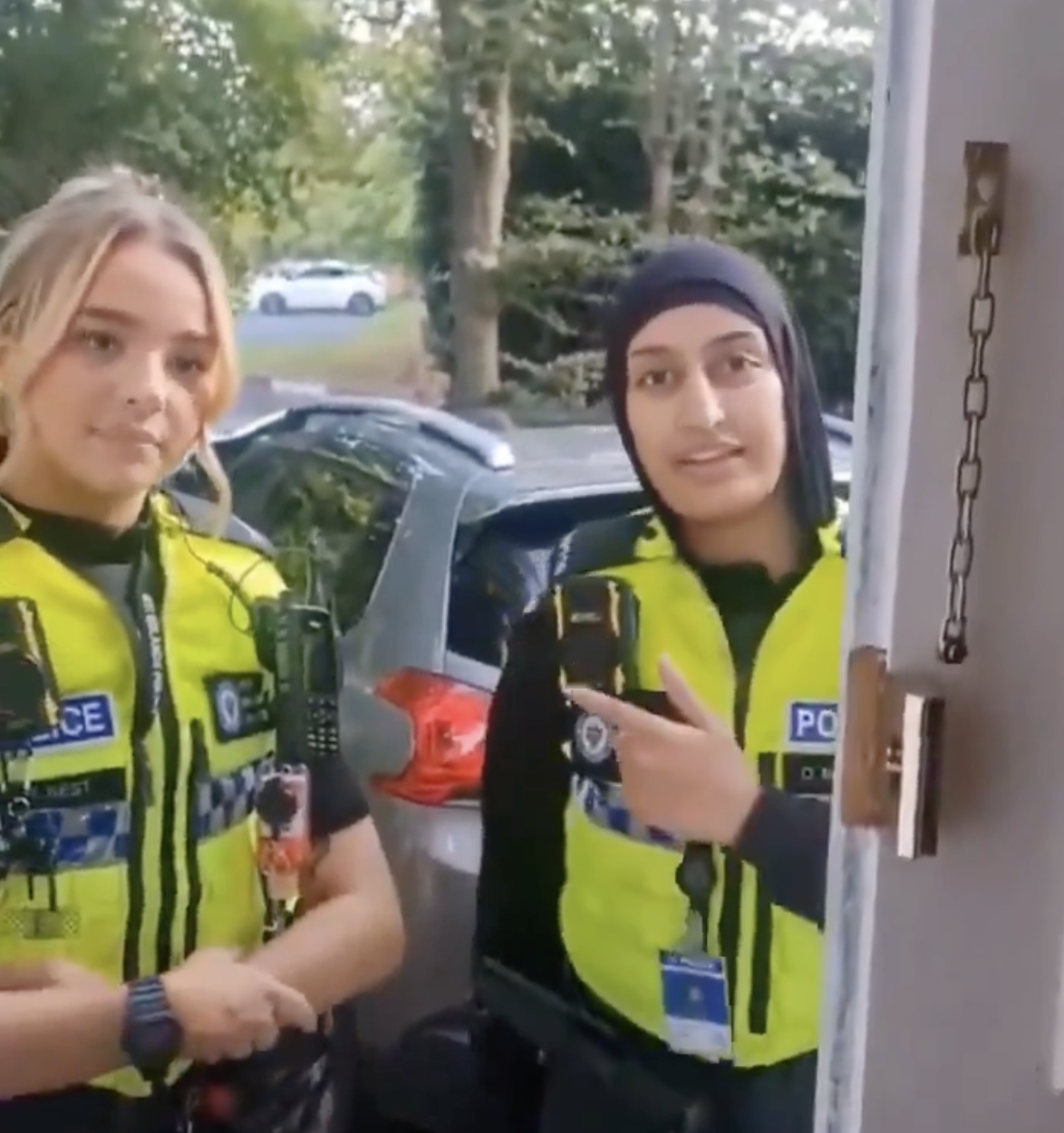Knock Knock: What to Do When Police Arrive Over Speech?
Britain is no longer a rich country, or a free country. Our constitution has been smashed into 1000 pieces, its existence hidden from the normal man. This article explains what to do when police attempt to use that mashed-up constitution to choke you to death, for tweeting (God forbid).

The British constitution does not rest in parchment. While it is commonly said our constitution is unwritten, this is false. It is written down, and has been hidden in hundreds of disparate places which the normal man can never retrieve it from – so, to its subjects (us), it might as well not exist at all. Due to its obscurity, it has gained a hostility to the Englishman through implementation - often to the delight of police and the judiciary, whose favourite pastime is turning the white working class English population into burgers and saussagemeat under the pretences of dispensing justice. Since the normal man cannot access the constitution by memory (as the English colonist in America can) the British constitution lives or dies at your front door, when someone in hi-vis comes to say hello - radio bleeping with false-urgency. That is where the abstract becomes concrete: where the legal fiction that your home is a castle meets the blunt reality of officers demanding to come in because of something you said online.
This is not about theory or abstract constitutional tinkering, it is about what the police may do, and what they may not do, when your speech becomes a matter for enforcement. The freedom of speech, like the right to bear arms, is an English invention – it belongs to the Englishman. Our peelian police (the creation, and global invention, of Sir Robert Peel) police with the consent of the free Englishman. If you do not understand the law that polices your speech, you will be policed by confusion, and deliberately confused – get in the van! Since the Englishman is unequipped with an easily understandable constitution, confusion is the tool of our increasingly malevolent, vindictive and thick police. They also don't understand the internet in the slightest, as I wrote for The Critic here in the wake of 2024's riots.
This can all be solved rather easily, by way of The Restorationist's speech bill, but until then...
Our police no longer police by consent; rather, they police by confusing you, and, by calling valid critique of their methods things like "disinformation" and "misinformation". To illustrate, I want to point to the recently-viral incident in Walsall, a market town in the West Midlands county of England, east of Wolverhampton. Two female police officers attended a private residence to engage in what appeared to be a police fishing exercise for evidence. A clipped and edited a video of them doing so was circulated widely on X (formerly Twitter). The video depicted run of the mill 'Yookay' speech & digital conduct policing (things that realistically should be the concern of platforms themselves and the civil law, not the police). We will call this 'The Walsall Incident'.
The 'Walsall Incident' Timeline
13 September 2025 – Police Attend the Door
Two uniformed officers from West Midlands Police visit a family home in Walsall. They state that a teenage girl has been “involved in a social media post.” They request to speak with her and to seize her phone. In the video that was published: No warrant is presented. No offence is named. The officers discourage filming. Entry is refused, but is later gained. Police are seen exiting the scene with no arrest made. Various portions of the video are omitted.
14 September – Voluntary Interview
The girl attends a police station for a voluntary interview. The mobile phone has already been seized. There is no arrest.
19-21 September – The Video Surfaces & achieves viral circulation
A short clip of the doorstep visit is posted on X (formerly Twitter) by user @donnalouise121. It shows the officers insisting on entry, failing to name any offence, and protesting being filmed. For those interested, it can be viewed here, reposted by "Lee Kuan Yew Geopolitics" on X.
The original video appears to have achieved virality on 21 September, I myself reposted it via retweting @morgothsreviews. I observed:
“No offence is mentioned in this video – often these bamboozling interactions are a result of the Public Order Act (1986)'s broad powers under s.4 and 4A – essentially speech/conduct/vibe offences that convict 10,000–15,000 people a year. They shall be repealed in full.”
Statistically, the Public Order Act (1986) is the act under which you are most likely to be arrested for speaking in Britain, it is the reason for many doorstep visits like this one.
Claims were made online that the Walsall video was AI-generated, staged, or in fact a pornographic flick directed by Drupka Kunley. This was not so, and I personally confirmed it to be genuine by calling the relevant forces on 21 September 2025. The officers' collar numbers (29110 and 29500) are real, with both verified to be officers with West Midlands police – one also showing on Hampshire & IOW constabulary's system.
West Midlands Police later issued a statement, a matter of hours after the video achieved virality on 21 September, which claims the video is "disinformation" – that oh so chilling and pravda-esque word that the British state now loves. It is in fact not, police routinely prosecute 10s of thousonds of Englishmen each year for speech offences, and, bamboozle them on the doorstep using four key acts, which you should remember – and begin to despise. The total convictions under all of these acts are in excess of 20,000 people annually.
21 September – Barrister Steven Barrett Releases a Video
Barrister Steven Barrett (@sbarrettbar) publishes a video offering advice on how to respond when police knock over online speech. Some points are sound: you do not have to allow entry without a warrant or arrest; filming the interaction is advisable; asking clear questions as to their purpose and what legislation they are acting under is wise.
However, Barrett seems to imply that police can enter only where there is a threat of imminent violence. That is not the law. Under PACE s.17, entry may be lawful for any indictable offence (which includes many either‑way offences) if the other legal requirements are met. s.17 also includes various summary-only offences, as exceptions to the rule.
Barrett is not right to suggest entry can only be predicated on a potential for imminent violence – particularly given concerns that speech itself is sometimes treated as violence in (wayward) police training or interpretation. Perhaps Mr Barrett believes that an ordinary man can simply block the police at the door—as he did me on X/Twitter when I invited him to write for The Restorationist. This could be considered obstruction.
22 September – The Original Clip is Deleted
The original post is removed by @donnalouise121. But the video has already been widely mirrored, analysed, and embedded across the internet. It can be found here
22 September – West Midlands Police Respond
The force releases a statement denying that the girl was investigated for merely viewing a post. They also take to X to use the community notes feature, on my post and the original video from @donnalouse121, claiming it is misleading (it wasn't). They claim the case involves a malicious communications offence, but no legislation is specified, it could be engage multiple acts, or meet the threshold of none. West Mids police stated that indecent messages were sent from a fake account impersonating someone else. They confirm that no arrest occurred and that the interview was voluntary.
23 September – Legal Representation Confirmed
In the video linked here, Barrister Daniel ShenSmith (@dshensmith) of @restorebritain clarifies his involvement. ShenSmith confirms in a YouTube video that he has been instructed to act pro bono for the mother and daughter involved. He states that the short video clip is real, and although edited for privacy, it accurately represents the doorstep interaction: the officers did attempt entry, did not state a clear legal power, and did object to being filmed.
ShenSmith explains that he has reviewed the full footage, which is significantly longer than the viral clip. He confirms it was not AI-generated, staged, or misleading in substance. He notes that police did not obtain a warrant or make an arrest and that the mobile phone was seized prior to the voluntary interview.
He also raises concerns about the police’s public statement and their labelling of the video as “disinformation,” suggesting that such characterisation is troubling, particularly if it turns out the girl was not responsible for the alleged indecent messages. He adds that there are multiple suspects and that the evidence may not support the police’s theory of the case.
Despite his professional obligations, ShenSmith speaks candidly about the constitutional implications: warrantless device seizures and coercive doorstep encounters are now commonplace and should concern every citizen.
How can this have happened in England? - What law could be responsible?
I have covered the specific pieces of legislation (there are four) which deprive the Englishman of speech, and attempt to turn him into a criminal for speaking, previously, and at length for The Restorationist. West Midlands Police have not specified which stirred them to action in Walsall, but it will be one of these four, take your pick. Here is a rundown:
1) The Public Order Act (1986) – A pre-internet act. Now convicts 10-15k people a year for vibe / speech based conduct. Famously convicted Lucy Connolly, mother and babysitter with no prior offences, for a singular tweet in 2024. The attorney general signed off on this gladly, despite her tweet mentioning race at no point (not that it should matter, known demographic problem-groups must be discussed openly).
2) The Communications Act (2003) – Famously convicted Mark Meecham, or Count Danuka for making his dog (a pug) perform a hitler salute in 2018. Attempts were made to convict Paul Chambers, a normal man with a Northern Irish girlfriend, who was arrested for a tweet joking about blowing up an airport in 2009.
3) The Online Safety Act (2023) – A bogus attempt to deny American websites from accessing customers, and, to suppress necessary images and discourse about the downward trajectory of the UK from reaching the British public. I will let the work of Byrne & Storm explain the particular evil of this act.
4) The Malicious Communications Act (1988) – Another pre-internet act. Largely replaced by the Public Order Act's modern overreach and the Communications Act / Online Safety Act's provisions. They often still attempt to charge using it for fun though (the British state hates you, hates freedom, and wants its indigenous people to die in a ditch).
Entry Without Warrant: PACE Section 17 Explained
Section 17 of the Police and Criminal Evidence Act 1984 (PACE) governs entry without a warrant. It authorises forced entry only for specific purposes:
- Executing an arrest warrant;
- Arresting for an indictable offence;
- Arresting for certain explicitly listed summary offences (under s17(1)(c));
- Recapturing someone unlawfully at large;
- Saving life or preventing serious property damage.
The distinction between offence types is crucial:
- Indictable offences include either-way offences when charged to be tried in the Crown Court.
- Either-way offences can be tried either in Magistrates’ or Crown Court.
- Summary-only offences cannot justify forced entry unless listed in s17(1)(c).
Offences That Do Authorise Entry: Statutory Exceptions
Some specific offences — even though summary — are listed under s17(1)(c) and allow warrantless entry:
- Public Order Act 1936 s1 – Wearing political uniforms
- Criminal Law Act 1977 ss6–8, 10 – Squatting and unlawful eviction
- Public Order Act 1986 s4 – Fear or provocation of violence
- Road Traffic Act 1988 s4, s163 – DUI and failure to stop
- Transport and Works Act 1992 s27 – Rail-related intoxication offences
- CJPOA 1994 s76 – Failure to comply with interim possession orders
- CYP Act 1969 s32(1A) – Arrest of remanded juveniles
- Animal Health Act 1981 s61 – Specified animal offences
- Breach of bail and certain remand failures under Bail Act 1976 and LASPO 2012
- Recapture of persons unlawfully at large
- Emergency power: to save life or prevent serious damage to property
Online speech offences do not fall under these exceptions.
Speech Offences: When Does PACE s17 Apply?
Whether entry is lawful depends entirely on classification and context:
| Statute & Offence | What It Covers | Trial Mode | s17 Entry to Arrest? | Notes |
|---|---|---|---|---|
| OSA 2023 s179 | Knowingly false communications causing harm | Summary only | No | Cannot justify entry alone |
| OSA s181 | Threats of death or serious harm | Either-way | Yes | Requires reasonable belief and suspect on premises |
| OSA s183 | Flashing images to provoke seizures | Either-way | Yes | Same as above |
| OSA s184 | Encouraging serious self-harm | Either-way | Yes | — |
| MCA 1988 s1 | Messages causing distress or anxiety | Either-way | Yes | — |
| CA 2003 s127(1) | Grossly offensive or indecent messages | Summary only | No | Cannot justify forced entry under s17 |
| POA s4 | Fear or provocation of violence | Summary only | Yes (exception) | Explicitly listed in s17(1)(c) |
| POA s4A / s5 | Harassment, alarm or distress | Summary only | No | Not listed in s17 exceptions |
| Affray / Violent Disorder | Public violence or threats | Either-way / Indictable | Yes | — |
"Open up! Police!" What to say at the door
Use this script:
- "Am I under arrest? If so, for which offence and which section?"
- "Are you relying on PACE s17 to enter, or do you have a warrant under s8?"
- "If neither, I do not consent to entry. I am not willing to attend a voluntary interview alone, and must seek legal advice first."
Do not obstruct, call them muppets (a s.4a POA offence as of 2022), but do not surrender your rights.
If a warrant is presented: check the address, the time, the items, and the issuing court. Photograph it. Ask for a copy. Request an inventory of any seized property.
If devices are taken: request a receipt. Where material is journalistic or privileged, demand it be sealed and handled under Schedule 1.
Refusing unlawful entry is not obstruction. It is lawful resistance to an unlawful act.
Voluntary Interviews: What to Know Before You Agree
The natural instinct of the Englishman, and all God fearing people, is to be helpful, charitable, admit things a bit, be honest, say "ohhh alright, but they can get over it and buck up!". Never do this under any circumstances. This is how the police turn you into burgers. Say nothing. Request a lawyer - let us hope he's good.
If officers do not arrest you but instead invite you to a voluntary interview, the word "voluntary" is important. You are not under arrest. You may refuse. You may leave the interview at any time. But there are risks and limits to refusing, especially if you do not know what you are being accused of.
If you are invited to one, say:
- "I do not consent to an interview at this time. I will take independent legal advice."
- "Please provide the allegation in writing, with the statute and section."
- "If you wish to speak further, you may write to me or contact my solicitor."
You can also ask:
- That the interview be scheduled over the phone (some forces may agree);
- That a solicitor be present or available by phone;
- That the interview take place at a neutral location.
If you agree to an interview, always ask: is it under caution? If so, you must be given a full set of rights under PACE Code C. You may request a solicitor at any time. You may leave at any time unless arrested. You should record what you can, and answer "no comment" unless advised otherwise by a lawyer.
Refusing a voluntary interview is not an offence. But it can lead the police to escalate, depending on the allegation. If they have grounds, they may arrest you instead. This is why legal advice — not blind compliance — is the safest option.
Voluntary interviews are increasingly used to shortcut due process. Remember that you are meat in the meat-grinder, and the police have no concern for what happens to you. Do not walk into one unless you know exactly what you're walking into.
Why This Matters
When the State moves from policing conduct to policing speech, the doorstep becomes the first battleground. Officers, often unsure of threshold, may default to assertion over law. Speech law is complex. But PACE is not. Either they can enter, or they cannot.
The Walsall case did not go viral because it was outrageous. It went viral because it was familiar, routine, and is one documented example of why Britain is now an international laughingstock.
Summing up
Say nothing. Don't agree to voluntary interviews. Tell police to go away unless they have a s.17 or 8 (PACE) reason to enter. Film them the entire time, including their badge numbers. Request a lawyer. Plead not guilty. Elect jury trial where available.




